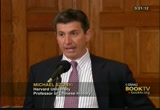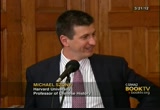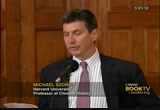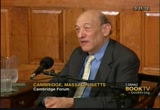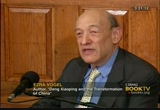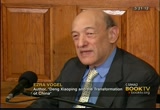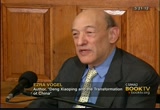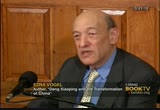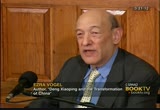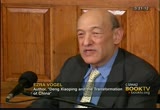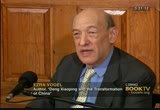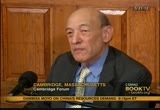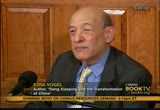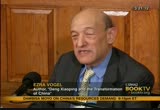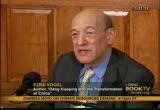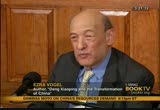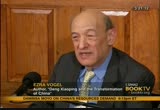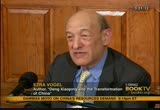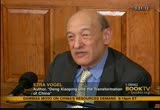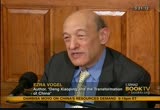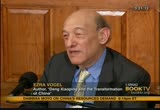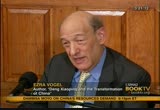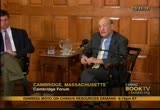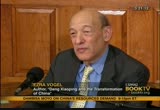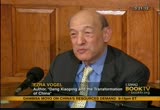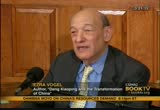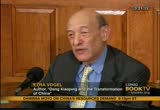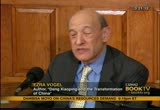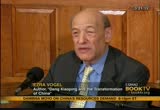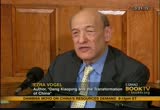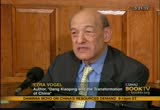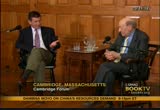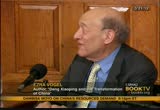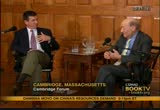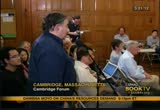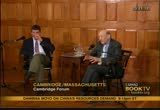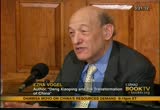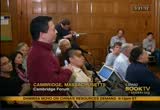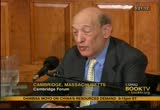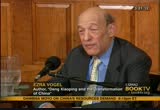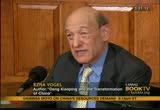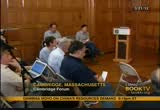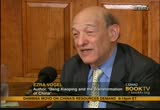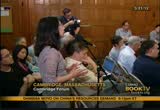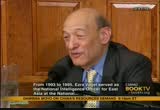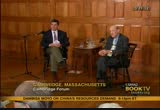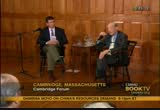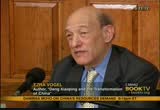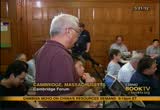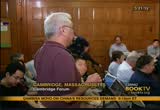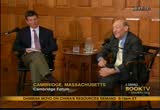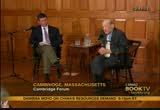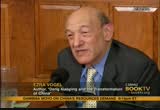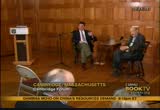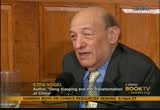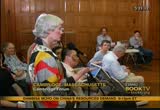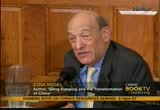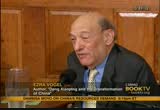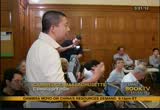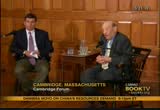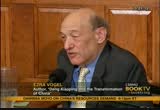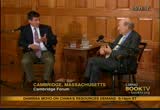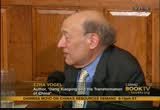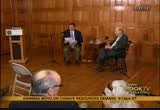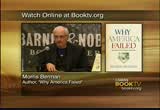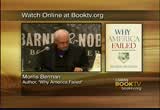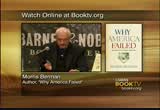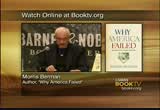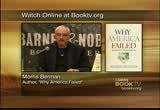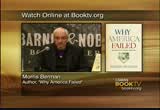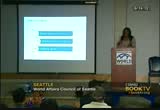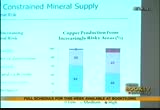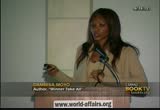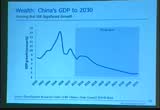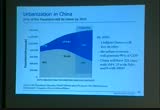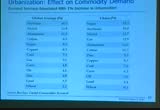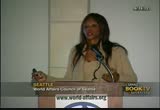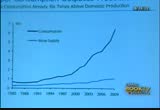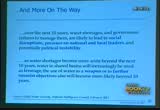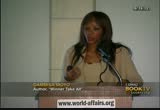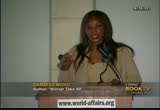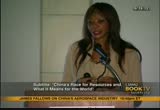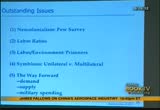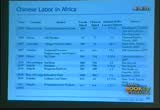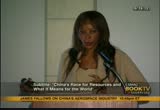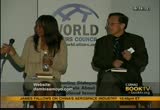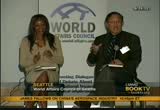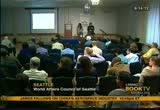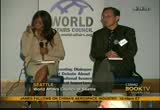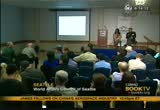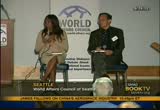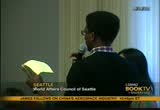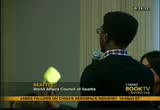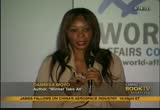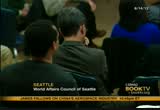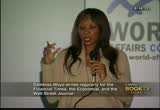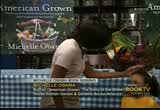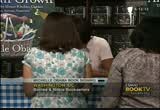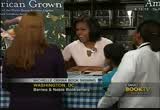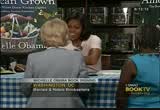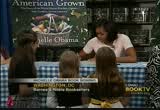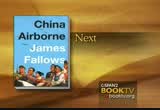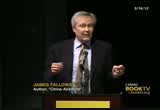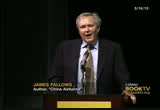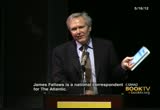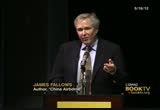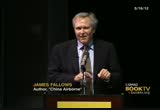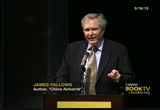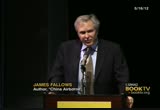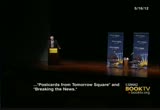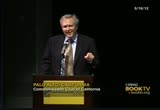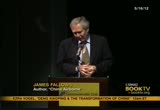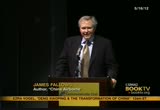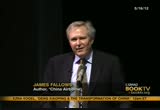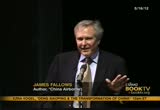tv Tonight From Washington CSPAN September 5, 2012 8:00pm-11:00pm EDT
8:00 pm
revisiting that history that through the modern day lines of the re-enactment, and the legacy of the revolution today. that is a book i really enjoy. >> he is sort of a quirky writer come is nt? >> his topic of interest were the very wide ranging writer and one to watch. >> book tv on c-span2. we have been talking with sarita varma, director of publicity at farrar straus and giroux hearing
8:01 pm
national what diligence officer ezra vogel discuss is leader deng xiaoping. it's a little over an hour. >> welcome to the cambridge forum discussing deng xiaoping and the transformation of china with harvard's ezra vogel. i am michael sony professor of chinese history at harvard and i will serve as the moderator for the forum. it's a great pleasure to introduce ezra vogel. he's the henry ford ii professor
8:02 pm
of the science emeritus at harvard, expert on both japan and china. he's visited asia every year since 1958. over his career, professor ezra vogel has offered that for offered back many articles of both academic and popular journals. the japanese edition of his 1979 book japan as number one. lessons for america is still the all-time best seller of nonfiction by a western author. in 1987, he began studying the transformation of china, spending eight months of the invitation of the provincial government exploring the economic and social progress of the province since it took the lead in pioneering the economic reform in 1978. the result was his book one step ahead in china under reform which appeared in 1989. professor vogel retired from teaching. i arrived in 2007, and i am truly grateful for the mentoring and the encouragement and the friendship that ezra has
8:03 pm
offered. a far more junior colleague but of course defending the colleagues has not been his main focus in the year since his retirement. rather he has devoted his time to completing his book on deng xiaoping and his era. the book was recently awarded the prize for contribution to international understanding. glenchur is we to be the first of many awards for this extraordinary book. the master full and comprehensive study chronicles the rich and intricate career from his birth in 1904 at the end of the dynasty to his death in 97 only a few months before the return of hong kong to the mainland. his life spanned almost a century of changes in china has experienced the war, revolution, the nellis era, and finally the economic boom of the opening of that reform. and he's played a major role in his nation's politics and development over that period. how does each find a way to turn china into a wealthy and
8:04 pm
powerful member of the international community? what personal and cultural factors contributed to the success? what obstacles did he face? how did he go about researching and writing his study of the life and legacy? welcome to the cambridge forum, ezra vogel. [applause] >> thanks very much. it's a pleasure to be introduced by one of the young stars around the world having had a ph.d. in oxford and coming from canada originally and harvard is very lucky to have him as a professor of the chinese history. when i was retiring from harvard in 2000, i was trying to think what i could do that would help make americans better understand what was going on in asia and i decided not -- 20 to get a little closer? i decided that of course china
8:05 pm
is the most complicated problem that we face in the future and that to understand china one of the most useful ways to understand the transformation that took place in china that set off on the path that it is going as you will understand the united states we understand of madison and jefferson and washington how they form the country but would be a very good basis for understanding what was going on in the united states so current china was very much shaped by deng xiaoping. he came to power in 1978 and was the dominant person right up until 1992 for the period of about 14 years. what i thought i would do in the brief time today i was told to not talk for more than 20 minutes would be to talk about some of the forces that shaped
8:06 pm
what he was and what he did to transform china because 1978 the country that he inherited had a per capita income of less than $100 per capita. now is estimated somewhere rs/6000 and it's on the path of that he is headed on. there is almost no migration from the countryside in the city and since he came perhaps 200 million have moved from the countryside to the town and the city. when he came to power the country was still involved in the cultural revolution and the relevant nettie toward each other and he worked to unite the country to set it on the new path. what are some of the forces that shaped him? one when he was 15-years-old she was in the county high school
8:07 pm
and at that time the year 1919 just after the reverse i treaty there was an outbreak of student movement in beijing it was the first abutting of chinese nationalism, and at that time very few high schools for progressive and joined the demonstrations, and the deng joined in the demonstration. a certain news that a certain time when they have their identity formed with a movement or with an institution when it becomes very basic and central so his dedication to national purpose really began already at age 15.
8:08 pm
the second thing i would mention is the experience in france from 1920 to 25. after world war i a lot of chinese students wanted to go abroad. they didn't have the opportunities that they have today to set in the united states and europe and australia and canada and get scholarships. what the idea was of some leading chinese businesspeople is they would work part time with and then divert money and they would study the universities and come back and bring what they learned to china and help build the new strong china. at that time, deng xiaoping was 16 and was one of the youngest in the group to pass to go to france and all of the country's this chinese students wanted to go to the time, france was the main one. during world war i, about half a
8:09 pm
million chinese workers went to the soviet union to work and about 150,000 went to france so there were a lot of work opportunities in france and the chinese felt that was a great civilization, so the group of use when went to france in 1920, 1930, 1920's, and from that group came the communist youth league. what happened was to get their first of the had to be pretty well-educated and that meant the parents had to have money. so they were not from the worker class or the peasant class. they were from the landlord class and the bruzual class. but when they got there what they found was there were no jobs for them he. the french would survive the war had come back. france was suffering from inflation and depression and there were no jobs and their
8:10 pm
jobs that were available when to frenchman and they felt their living in very lavish homes and luxurious style of life. yet the workers were very poor, and at best the chinese that were over there could get dirty greasy jobs the french workers didn't want to get. so, when they formed their study groups and tried to think of what is the broader explanation of what is going on it happened several years earlier in the soviet union if 1917 it made a lot of sense. it seemed like the bruzual people were exploding in the working-class, and that the country's that were already fairly well developed were exploiting the imperialists and those in the relations so that group that had gone to france were so disappointed they could not study and universities, they were not able to save enough money to get into the
8:11 pm
universities. and so they just continued to work in the factories they were very disillusioned both with their own country for not coming up in scholarships and they had been encouraged to go there and for the french government not making any effort to support them. so they form the communist youth league. the leader of the scriven france and. joe that was about six years older and later became the premier foreign minister and was the one agreed henry kissinger and when they went to china in 1970 and 72 the third experience i think it was very critical in shaping deng's character and point of view was in both the wartime from 1937 to 1949. he was in the army for 12 years
8:12 pm
and was an active wartime. so his job as a political feeding unit as the french commander for the largest military battle in the history of his roland was to try to rally the troops. now that deng and a lot of other leaders for lead in the 1940's which was more protected from outside and they had room to talk about theory and philosophy and train the generations but he was on the front lines for 12 years. his job was to get ready for the next battle. he had to be pragmatic. he didn't have time to talk about theory and philosophy. he had learned a theory in moscow after france where he was for year but he didn't have the time with to engage in the battle, to engage in theoretical
8:13 pm
discussion. another important influence i should have mentioned about the year in moscow with is that when he was in moscow was in 1926 to 1927 and the soviet union had a new economic policy. the economic policy was to have the communist party in charge but not the of the markets open to foreign trade, open to the foreign investments and the communist party was able to provide leadership for that. and we had this experience and 52 when they were in charge of the southwest bureau that hit the province in southwest china which about 100 million people because the laws before they had what they called the socialist transformation, he had lots of experience of leading the communist party is having an open market economy. so after 1978 when he began to
8:14 pm
develop to that pattern of the communist party meeting an open economy it wasn't new to him it already had that experience. another important experience that helped shaped deng xiaoping was his experience as the general secretary of the party. now that he liked the mao but in the early thirties when he deng was criticized and purged for leading the faction he was in the province and down there he was accused of falling to closely to mao and he was purged for that, so that is from mao and he conceded that deng is a capable person, very bright and able so they bonded very early. and so, from the mid-1950s until
8:15 pm
1966 with the cultural evolution he had the experience of being the general secretary of the party over all party activities. they have the chairman of the board as the chairman of the party as the chairman of the country. deng xiaoping had the responsibility of dealing with practical issues. another thing that shaped deng that was important in achieving deng was the great record. in 1959 when the great leap forward was really devastating the countryside people were starting in large numbers, and the latest estimates are that perhaps 40 or 50 million people were died prematurely during the great leap forward because of the famine that was caused by the excessive zeal that wasn't
8:16 pm
based on realities mao had never been a broad but deng had been abroad and had a much better understanding of what was going on. now, let me. and he was still pursuing the evolution to the end he wanted to shake up the country and to have people attack those who were going and what was called the capitalist road who were free and independent. so most of the senior leaders of the party were criticized and purged by mao's doing. so, one of the first things he did when he came back after
8:17 pm
being purged again by now come in 1975, one of the first things he did was to start working on education. he took over the responsibility for the foreign relations and education science technology in 77 when he came back to work. mao had purged him once at the beginning of the cultural revolution, but he always wanted to think of him as somebody that might learn the lessons and be faithful to him in the long run. so while some other people were purged and prison, deng was sent off and the hope was by now that he would come back and work for the good of the country and really help the place grow. well, deng, when he came back as i said in august of 1977, one of the first things he did was to open the universities and to require entrance examinations. the universities had been closed
8:18 pm
from 1966 at the beginning of the cultural revolution. and deng felt that for the country to progress, the modernizations, industry, agriculture, national defence, science technology education, science technology education was the most important and you wanted the students to come back to the university's. the political considerations were always very important in getting into the universities and going for the education. mao of the people that were absolutely red. deng felt that in 1977 there were no longer any landlords. they'd been wiped out early in the 1950's so there were no booze rall people. it's there for the country cut go strictly by merit and so the entrance universities were
8:19 pm
strictly by merit and in 1977 when deng decided to open the universities, he made an entrance examination and those that past got in. as of the people that first past those tests were like 7 million that took the exams and the few hundred thousand that entered into the universities. but a group of talented people many of whom had worked in the countryside or had been involved in other labor when they wanted to study were extraordinary thankful for letting them come back to the universities. another thing he did was very basic is send people abroad to study. when frank press, president carter's science adviser went to china in the summer of 1978 when they've just began the normalization and said we want
8:20 pm
to send hundreds of students to the united states as soon as we know and we want tens of thousands to go later. are you ready to accept? he didn't know why quite what to do. he phoned jimmy carter in the middle of the night, and i interviewed jimmy carter about his role in relating to deng and they said they need to we can up in the middle of the night. but he was waiting until 3 a.m. and he said sure, go ahead. and he was ready to go ahead in the center of the students abroad. now, over 1 million have been a broad, and deng's students were able to achieve what he was not able to achieve in the 1920's, the opportunity to learn from worldwide what was going on. one of the biggest reforms that deng made was the collectivization. it to manage this publicly was
8:21 pm
quite extraordinary because many people who were dedicated communists and many of those that work in the countryside that the system was a basic and that the collectivization was the basis of what they were trying to do. he managed to handle this politically and beautifully. he didn't do it like an american politician standing up at the campaign and saying i'm going to be collectivized. not at all. what he did was to allow one of his best friends to go in the province which has some of the biggest starvations, and he told them that people are starving, you've got to let them do whatever they can to find a way to earn their own food and survive and not starve to death. even the conservatives could not oppose that.
8:22 pm
so they let them decide what they could do to get ahead and sure enough, a lot of them began forming their own family plots and broke out from the big collectives. then what he did is he said some journalists to observe what happened and report and they reported in beijing that there was a lot of progress. production had gone we have in those areas where they tried it, and then he announced that if people really wanted to in the areas where there was serious than that they should be allowed on the broad scale to find a way to produce goods on their own. within a year or so, over 90% of the country had the collectivized. it was a way -- was a brilliant way in which he kept the support of the conservatives. you can go out on any lamb and
8:23 pm
he let it develop gradually so that more people support to read in the fall of 78, is one of the reasons why i mentioned this in the cultural revolution as being so important is because it led him to think that china needs to go a very different path, and one of the important things was also forming good relations with the major countries from which they would learn. he had already been to europe in 1974 and 1975 as well as 192025. as a cut in the visit to the united nations in 74 to france in 74 and france in 75 and two southeast asia and early 1978, he had a good idea what was going on in the outside world. but he wanted others to get that same kind of message the summer of 1978, i'm sorry, may, 1978,
8:24 pm
encouraged the delegation led by a prime minister to lead a group of people from all of the major economic units, all of the major planning commissions and construction commissions and large ministries concerned to take a five week tour of europe. when they came that some thought that was led by e.m. delete command and some people thought when they came back they would have meetings that would last a couple hours. they started at 3 p.m. and finished at 12:00 midnight. with the group reported is that china was far behind the west, much further behind than they thought. also, however, the european countries were ready to lend money and help out with the new technology. so, rather than being discouraged by being so far
8:25 pm
behind europe, they were very excited about what they could do as a result of that visit. succumb in the 1980's some other thing that he did was begin to open up markets in the outside world. and here he played a very key role. he knew that if he immediately said the whole country has markets the conservatives would be infuriated and there would be a lot of position what he did was say let's try some experiments. if they are working someplace, we will just see. and he allowed some of these special economics down near hong kong along the southeast coast the areas in which a lot of the chinese had migrated overseas to begin to open up, and he also knew the people that have migrated overseas had often been
8:26 pm
successful business people and were willing to invest in their own local area. so, he let them begin to bring in much and because the government of beijing was so short on money they were not relying heavily on these outside investors to provide the funds to get those started and once those experiments started, then deng encouraged the high level leaders to go visit and to see the progress, and of course they were all stunned by the new industry and construction that they saw. that built up a broad basis of support so those experiments could then begin to spread the of the localities. in 1981 he faced a very serious problem of student demonstrations. the students -- let me back up.
8:27 pm
in the beginning of 1989, gerber just -- garbus -- gorbachev had been broken up and 63 by deng himself when he went to moscow to argue. but in 1989, he would write vv to invite gorbachev and his wife to come on the conditions that they would pull out of afghanistan, pull the troops back from them border and vietnam would pull out of cambodia and they accepted his position so he invited the news people from all over the world to come to beijing but when he got there what they found were some student demonstrations. they started out on the death of a very progressive and the students were so upset that their beloved leader had died and he wanted more democracy and
8:28 pm
he wanted more openness, so they began to demonstrate. there was still a lot of political control over students ignored the very people that upset them, so there were a lot of urban support for the students who were demonstrating, and they saw that the huge demonstrations. and after he left, they still didn't quiet down so deng warned them if they didn't quite a down that he would have to take some stern steps. on may 20th, 1989, he brought in the troops and unarmed to try to get control. but they couldn't get control. they ran into all kinds of obstacles to the people who didn't want the troops coming into the city. so he supported with the other leaders decided to allow the
8:29 pm
troops to what was necessary to regain order. and on june 3rd and on june 4th of they entered the city and the best data that we have is that as many as seven or 800 people that were killed on the streets of beijing during that crackdown. i think that if i had written by the 20 years ago, nobody would have paid attention to it because people were so upset at what he did to crack down on june 4th that nobody would want to think about his historical role. in my book i try to be very clear on what he did and cracking down on june 4th and there's still a lot of people who feel that was a terrible thing. but i think as we look at the chinese history, we have to recognize his historical contribution. if we look at people like thomas jefferson and george washington,
8:30 pm
they were slaves, lots of slaves. the was a terrible and humane thing. if we were to think about their role in history just on owning slavery, we would have missed a lot about what they did to form their country. and as deng xiaoping, he was a complicated character. he didn't crack down. he felt that he needed to keep the peace and allow the country to grow. but he also led the country to the education. since he came to power perhaps 300 million people have come out of poverty and they are now living fairly comfortable lives. the countryside has turned into an open era. he has brought modernization technology and has raised the standard of living and the chinese people have really changed the world, they've entered the international organizations. students have come across and have come back to china bringing new technology, new ideas, and
8:31 pm
8:32 pm
that he has played in remaking history. thank you. [applause] >> your brick structure in three talking about the leaders on deng xiaoping. when you're talking about is life in the military, you mentioned he was pragmatic and too busy for theory, which is ironic, given he is the author of deng xiaoping theory, which students in china all have to study. one of the interesting things i've found in the book is the suggestion that some of the reforms for which he is ms were begun under his predecessor, interim leader, hua guofeng. they involve transferring practices that have been tried out in places like south korea
8:33 pm
and taiwan. was deng xiaoping a visionary? was the simply a good learner? or was he as suggested in the conclusion of the book a competent manager? >> well, i go for the confident manager if i had to pick one phrase because the idea of reform and opening was not deng xiaoping. and even hua guofeng who was criticized as his predecessor, who turned out not to be really a great, strong leader was in favor of a lot of reforms. and a lot of the senior officials were in it for a lot of the reforms. to some extent, you did have a long-term perspective and whether visionary is the right word. when he thought about hong kong's ami said for 50 years they can keep the present system. if you ask obama, you know, what
8:34 pm
do you plan to do for the next 50 years for this country, and i would hardly be a serious question. i mean, no american leader is long-term to think to the end of your term to the next election. so i think he did have a long-term is. at the same time, he was experimental and he didn't have six notion and he used the expression, across the river regrouping for stones. and again, that term is somehow attributed to dan, but he didn't invent the term. he used the terms, he used the ideas and he was a manager who put it all together and provided the direction, the firm hand that made it all happen. >> you also talk about a skilled politician and pushing through the de-collectivization reforms. we have seen just this week with the ouster of one of the leading
8:35 pm
stars of young leaders in china about personality, politics and factional politics remain very important in china. what enabled him to be so successful at managing and recognizing factional interests and factional differences? >> well, one thing i think he had the authority that came from working closely with mao and sean y in 73, 75. worked in france as a young man and he also worked very closely with mao. but i think it was also -- he was for. he remembered things and have a long history. when i interviewed lee one you
8:36 pm
about deng xiaoping, he was as great of a leader as he met because he was able to recognize what he had learned and what he put into practice with networking and he was ready to try something new, but step-by-step in a way that people could accept it and would not add the polarization, but would help resolve polarization. >> card is a skill that many politicians could benefit from having. welcome to cambridge pharmacy continuing discussion of deng xiaoping in the transformation of china with the team for scholars, as stretcher and three. what deng bring us a powerful player in the pacific rim and the national economy? at this point will take questions to the audience. please sign up at the microphone and asked one question. want to get as many view as possible a chance to ask your questions. >> thank you. i'm wondering if you would care to go off from the chronological history about what transpired
8:37 pm
you to develop the country into its political philosophy. as the great chinese miracle is blooming, there are tens of thousands of chinese, particularly in africa and other parts of the world gathering resources to feed the great dragon if you want to call it that. and how the chinese people in these foreign countries are absorbing information, education, whether they want to stay within the countries they have visited or if they pledge to dedicate it to return. so talk about the tibetan buddhists, stuff like in the scheme of this development of china. 30, 40 years southborough speared >> my major was theology and sociology, so i'm happy to make comments. although now is revolutionary in theory, he blocked the ability.
8:38 pm
he led people in the countryside had to stay in a commune. they could move to the city. and people who worked in a certain unit in the city were bonded to that unit and they couldn't move easily to other units on the housing assailed by the states. so why deng did by opening up migration, allowing people to move from the countryside to the city as they had enough food to feed the city population, completely transformed a society that had been really rigid and locked in to one that was mobile. the old family system and a lot of the rural areas was not preserved when you move so rapidly and people in the city only had one child. as for the chinese going overseas, there's many different kinds of reasons and jenny is
8:39 pm
going overseas. some are diplomats who want to keep good relations. some are working for chinois and a private capacity to see what's going on and pass it out so that they're well informed of what goes there. some are companies out there to make money and look at investments. some are energy companies that are set by the state to try to establish solid sources of energy that will can send you to feel china as it continues to have more fuel plants and remake china. so that's a quick answer to some of your concerns than i think that's a very quick overview. >> i just have one comment and one question. the comment is the allegheny underpinning of what you just described all he did.
8:40 pm
that was his uncanny and unrivaled ability to seize power. for example, in shortly after he was restoring all of this company started restructuring the decor of the chinese communist party leadership. and the other example is staging the more in 1979 that the real purpose was to challenge the communists applauded at this time. their nominal soon after that, the communist party chief wasn't marginalized and eventually all and none of the leadership. so without his breath ability to seize top power within the chinese communist party, nothing would be possible. the question then is, just very
8:41 pm
recently, there has allegedly been, within the core of the chinese communist authority, being tentative proposal to at least reevaluate the decision of the tmm massacre. of course this being highly controversial within the core of the communist authorities. so i want to comment on the impact, the destabilizing impact under chinese communist party on turning the table around on this issue. >> in first-year assumption general comments, it is true of course anybody have to have a firm grip on power to carry out his activities. and it is true that hua guofeng
8:42 pm
was pushed aside within two years after the vietnam war. but i don't think those are related. i talked to lee kuan yew who followed the work carefully and i talked to many others that went through the records of the war. and what chen was concerned about in 1979 when he invaded vietnam was that the soviets and vietnamese were cooperating. the united states had pulled out of vietnam. he was very worried that the soviet union and vietnam were going to circle around and circle china. ben galbraith was being used by ships and there is a real danger and that was the reason he went to war in vietnam. there were many other ways to push aside and he didn't have to
8:43 pm
do much pushing. it was done by others, basically in november, 1978 by a group of seniors, 79 paul chen was in southeast asia, that they began to push aside. secondly, on the question about shooting for, it is true that there are a lot of people in china who feel that those who were criticized for farming demonstrations and so forth should be considered teachers and that their cases should be reversed. they should no longer be considered people who challenge the order, but a healthy order. because there are certain people living who were deeply involved in the june fourth and thinking particularly lee pollin i think is one of my best friends who
8:44 pm
buy the inside of power in eggs in china suggested it would probably take many more years. they do expect that there will be a reversal of verdicts in tiananmen, but probably not during his lifetime and probably not during deng's administrative lifetime. >> professor vogel, i appreciate your comments on the experimental measure of deng and his reform. and as we observe china, i think going through a history of reform without blue prints. and i also wonder -- i haven't read your book. i am just curious, when you said that he had a long-term vision of hong kong, did he have a similar vision on taiwan, the sovereignty of taiwan and tibet? and if so, has it been going his
8:45 pm
way? >> thank you. first of all, thank you for all your help at the asian center. he did for taiwan. he also wanted taiwan to the same system for 50 years and he was pretty not even to station troops in taiwan and let them have their own troops. unfortunately he was able to resolve the taiwan issue. and what he thought was most critical as america was still sending arms to taiwan and therefore taiwan was not willing to begin to negotiate and they thought as long as the united states is behind, they didn't have to negotiate. so now we have a very complicated situation, and tension between the united states and china over taiwan because as america sells arms to taiwan, then taiwan does not want to have political integration where they feel they could remain independent.
8:46 pm
and that's very disturbing. he had hoped in his lifetime he would achieve the unification of taiwan, i think the most bitter disappointment he had with his achievements as he was not to bring taiwan back into the mainland. >> after the business leads and taiwan talking about reunification becoming inevitable. >> is certainly would. >> hi, professor. i have a question about the current new administration. china is going through changing the kurds and the recent scandal seems like it is a comment that china is going to go backwards, it's going to be less open. i wonder what is your view about the new situation? added following the path the deng xiaoping, becoming a more
8:47 pm
open or is the kind of going backward? >> there's a lot of names we don't know. in the united states before a person takes office, we have election campaigns, with constant exposure to tv and press conferences. now, champagne, the new successoreeps quiet as possible. he knows if he speaks out it may disrupt things and it's very difficult day or two and that's what he would do. he's not telling what he would do. he's not stating his policies. one can say a few things from his background. i think we give some clues. one is when he was in through schwinn as party secretary, he was very open. when he met foreigners in australia and japan and iowa, they thought he was a very open and they can do it in a very frank and direct way and that is
8:48 pm
very bright. the third thing i would say, judging by his father who was very unusual. he was one of the leaders of this new opening, a new special economic zone and was out on the front i'm doing now. and also, hu yaobang was criticized and thrown out in january 87. he was on us the most liberal and open-minded about the chinese leaders. there is only one leader that stood up at that time and that is champagnes bother. there is some hope they he would be a more open later and continue reforms more than the present leader is doing. we have to go in order here. >> i have a very related question.
8:49 pm
many people say the transformation of china is not yet complete and the leaders -- the transformation of china is not yet complete and on the part people have done, that deng xiaoping has done with the transformation and the political transformation is predicted to be more difficult, may involve more interest. as so why we learn from deng's leadership skills and the tragedy he used? how much can we apply those experiencing the political transformation? >> as you know, there is an expression of a continuous revolution, continuous reform. it is not just one stage that is all done forever. i think the reforms opening will
8:50 pm
continue. and for example, the rule of law will be more important. however, i don't think necessarily we should expect them to follow western-style democracy. it is not clear to me that that is their vision. i do think they need to find a way to a broader public representation so that leaders have a broader base of legitimacy just in perpetuating a communist party and they're experimenting with various means and the communist party of voting national people's congress. there's more fighting and more dissent. more cases where you predict group of cases and let people concerned choose which of that group. answer these experiments with the elections. so i think these experiments will continue and that reforms have many kind will continue for many years. i think particularly now that corruption has become so widespread in such a serious
8:51 pm
problem that champagne will have to take further steps to deal with corruption than the current leader does. >> thank you, mr. vogel. and they can bridge resident. my wife is seeking treatment, so i ain't mr. vogel is a well-known chinese expert, highly evaluated by the chinese academic and intellectual. and the ink what you talk about in deng xiaoping's character, deng xiaoping's competence as a
8:52 pm
leader, all are very good. he opens the doors 30 some years ago after one benefit person in the country and out-of-state 82 years ago. but deng xiaoping is a good decision-maker. he makes decisions. click, sometimes too quick. so 1989, june 4th, the trouble is caused by his own mistake. if you don't discharge the general fact her, you won't have so many students after hua
8:53 pm
guofeng passed away on the streets. the deng xiaoping statements. also, he -- [inaudible] could we move to a quick question possibly. >> yeah, but i want to say something. but also as he is not a good reader, he's a good leader, but not good reader. all his spare time is to play the part, bridge. keep remote his bridge partner to a higher position. so he makes some mistakes. i don't want to raise people's money -- people's time. i will buy your book. i will ask you about it and i appreciate this my comments to
8:54 pm
your talk. >> thank you very much. i think deng did play bridge often once or twice a week day but it's natural to people he play bridge with were promoted. i was able to interview one or two of his bridge players. who among you was that they not promoted and was a brilliant rich player. [laughter] also come a deng he played her as she often got into a bridge plane star. he thought it was a good mental exercise to think about bridge. and so, he often had a partner to as a bridge plane star and the other side also had one. so he thought that would improve his own scale. he also liked to play pocket
8:55 pm
pool, billiards. he often played but also. thank you. >> the first time i'd been to the program at harvard medical school and brought chinese students here to learn about basic sciences. and the interesting thing is students were all very bright and they knew their facts, but the teachers and professors never questioned anything. and so one of the chinese american professors deliberately gave the wrong instructions for an experiment and then the lab experiment didn't work, he said can you believe me? my question is, is this still true of chinese goods? are they learned to question even the learned professors? >> says china has 1.3 billion people, there's quite the variation. but i think there's a very strong kernel of truth that is
8:56 pm
still true. in the better high schools, the key point is to get ready for the university exams and that is learning facts and mastering information and they do that very well. and the critical judgment is not something that is as much a part of his chinese education as part of hours. however, if you have 1.1 million people gone abroad, a lot of them have spent enough time here but they have more critical minds in over 200,000 of that group have gone back and a lot of them become teachers at key universities. sister is an attempt in many universities to try to develop critical thinking and a better life. but still, i think the dominant pattern is to learn the fat, learned the information and see who is the brightest to get the
8:57 pm
information to getting the next level of examinations. that is still very dominant. and in china now wants to become a leader in science to allergy. i think it is not only the party has trouble attracting the world's best scholars because of some clamping down on free thought and free expression, but it's also the fundamental issue that you draw attention to. that is that people are not taught to think critically. >> pattern of this is your ears, but in some ways are the beneficiaries here at harvard because students have rejected that and demand critical thinking. those are some of the brightest. >> beyond that they also develop critical thinking. they have questions. >> professor vogel, i imagine it will be 10 or 20 years before
8:58 pm
another biography but deng xiaoping at the level of yours is going to be resting. when that book is written, what would you like to see a cover picture book was not able to cover? [laughter] >> that is a great question. and when i was writing it, i was afraid someone else might beat me to it. [laughter] but there is nobody else that's done anything comparable and it would take a few years to get anything comparable and i have a lot of good luck, some of which was having so many chinese students here who develop connections and could interview a lot of people, ordinary people could not interview. when i hosted zhao ziyang in 1998, said that interview had about deng xiaoping. i don't own on all sets and vpn.
8:59 pm
one source of information is going to come out and that is a lot of the stories of the meetings. and a lot of the rich detail of discussions and i think records of meetings will come out and give a much richer picture of the decision-making process because deng did not keep notes. it's tough for a biographer of deng. i think what i would like to see and i may not be a literacy and 10, 20 years when a calm, but i hope they would make full use of records that give a richer picture of the actual decision-making process and consideration of what happened. i can sort of gas, but i couldn't nail down. thank you. >> you spent -- give us a very rich picture of the factors that contributed to deng success. i know you don't have a lot more time with us tonight, but aside
9:00 pm
from june 4th, what were some of the big setbacks or challenges that he faced during this long, long career? >> to three times he was purged, the first time he had been county cheese aberration counties and he was thrown out of that job and for six months wasn't sure he was survived. the one of the people who would enlist him in france, who was then head of the provincial party committee brought in mind to take charge of propaganda for the clinic. the second time of course he was purged was in 1966 at the beginning of the cultural revolution is one of the two theaters in authority who had taken the capitalist road.
9:01 pm
the third time is the end of 1975, 76 when mao again persian for fear he would not follow his path to continue the revolution and continue respect her words mao had done. so i think those were all the kinds of names that were set back. but i think in terms of things that she might call errors. another error he made was in 1988. it was true he wasn't any big hurry. the person he was paired with, chung yuan worked very close with him and in some respect was much more cautious person. and when they worked together, they often accomplished much, much more. in 1988, deng is in such a hurry to reduce prices that he knew he was going to add his career soon
9:02 pm
and he wanted to finish that off before he retired. so he released all kinds of prices at a time when there was already inflationary pressures. so that made inflation go away skyhigh and that's part of the reason so many people in beijing were no longer enthusiastic about deng as they had before. >> professor, thank you very much for presenting this history to american people. at 40 years old. i am from beijing and this is now telling the history of his%, also the history of a lot of people of my generation. i grew up with his policies and i think this is great, like more american people know better about what it did in fact in china just about the superficial
9:03 pm
events, reporting from the newspapers. so this is my fourth book already. i usually give them as gift to american or other people or those who are willing to know better about chinese history during the past 30 years. so my question will be very simple. this is the history for the future and for the near future. what is your point of view between -- i mean, what is your point of view between the chinese riots and the american relative decline. will they be punished or will they be anomie is? >> i think there would be a lot of tension between china and the united states. as kissinger pointed out in his book, you know, for eight
9:04 pm
presidents, once we'd been with nixon, all of them felt we must be engaged with china and must work with china. so even though there's a lot of tension and competition, in the end i think it's in the leaders and she is scum of the leaders of both countries recognized it is in their interest to contain pressures for competition and particularly for distress. i think the most critical single problem we now refer to as strategic distress. we are not chinese military intentions and they're not confident about americans. we say of course you want to engage in china and expects maybe we really don't. and we hear the chinese leaders say they want a peaceful rise, but then in the south china sea they have many patrol boats coming in conflict with the patrol boats from other
9:05 pm
countries. so i think is going to take a lot of determination on a part of a lot of leaders and much more open discussion of military goals and much more transparency in military preparedness on both sides in order to achieve the kind of cooperation and peaceful future that we all want. >> china faces a lot of challenges today, not just internationally. many challenges created either by the policies implemented or pricing issues that occurred on his watch. china faces a looming demographic challenge, both in terms of declining numbers of working age people and declining a terrible sex ratio imbalance to the one child policy including challenges driven apart by the expansion of the
9:06 pm
economy, political challenges driven apart penetration of the middle-class to know which is demanding the rights and so on. deng has gone to meet marx, but if he were still on the theme, what would he think were the biggest challenges facing china and what would he be doing about them? >> i think that's a great summation of the issues they are facing. i think as deng were still alive today, perhaps the biggest issue he would think of this corruption because deng always thought of political support as key to one of the most fundamental things he was concerned with. there's a danger people will no longer support in the years of the communist party. when he was up and down in 1992, he said we must use to face. we must grab reform that once asked and grabbed illegal behavior, corruption but the
9:07 pm
other fast. they're a much stronger and have a stronger base of power than the leaders do nowadays. but if he were alive, he would certainly attack that very vigorously. in terms of openness, i think also he would work very hard to jolt the strategic mistrust with the outside world. he thought the soviet union had been a terrible error by having anomie spending so much on the military and exhausting the nation and trying to maintain the small military when they didn't build up their own kind sure you and he would slow down the growth of the military ever to have better relations from major powers, including japan, especially. but i think you would also want to make sure that they didn't spend so much of the military. >> thank you, vogell.
9:09 pm
>> i think it's a noble for posting this so we can get together and talk about issues that i think are very important. there seems to be some confusion in the united states. a lot of people don't realize that america failed. they think it's still going on. just as i entered here, some guy said to me, i didn't know america failed. i said stick around. i also wanted to just locate this particular talk in terms of the stuff i've been reading.
9:10 pm
this is why america failed, a third in the trilogy of the american environment. the first one was the twilight of american culture, published in the year 2000. the site was called dark ages in america and as fixing this came out a month ago, why america failed. there was however a collection of essays that i published about a year ago that came between books two and book three. about half the essays are about the united states and a kind of want you to a cursor they look at that book. it is called the question of values. the reason it is important is there's material in there that is not in the other books, but deals with the kind of unconscious programming that americans have that leads them to do the things they do, whether the person is in the street for the president. and that sort the picture. i want to encourage you to have a look at that book.
9:11 pm
the title of this talk tonight is the way we live today despite great pressure to celebrate the united states is the best system in the world does last two decades have seen numerous works criticizing u.s. foreign policy, u.s. domestic policy in particular economic policy. the american educational system, the court system, military come in media, corporate influence over american nights and so on. most of this is very astute and i have learned much from reading these studies. but two things in particular are lacking and have a hard time making it into the public eye, partly because americans are not trained to think in a holistic or synthetic fashion and the analysis we mind is too close to the bone. it's too difficult for americans to hear it.
9:12 pm
and someone would say, i didn't know it failed. the first things they were to lock is an integration of the various factors that have done the country in. these studies tend to be institution specific as those the institution under examination existed in a kind of vacuum and could really be understood apart from other institutions. the second thing i find lacking is the relationship to the culture at large to the values and behaviors that americans manifest on a daily basis. as a result, these critiques are finally superficial. they don't really go to the root of the problem and this avoidance enables them to be optimistic and which in fact places them in the american mainstream. the authors often conclude these studies with practical recommendations as to how the particular particular institutional institution of this function has identified rectified. they are as a result not much of a threat.
9:13 pm
there's usually a mechanical analysis of a mechanical solution. if they realize these problems do not exist in a vacuum but are related to other problems that are finally booted in the nature of american culture itself, in its dna so to speak, the prognosis would not be so rosy for it would become clear there simply is no way out, but turning things around is not really an option at this point. to take just two examples, michael moore and noam chomsky, i admire them greatly. they've done a lot to raise awareness of the united states, to show that both foreign and domestic policy as currently pursued by dead ends or worse. yet both of these men assume that the problem is coming from the pentagon and the corporations, which is partly true, of course. the problem is this rests on a tour of false consciousness. it is that these institutions have pulled the wool over the eyes of the average american
9:14 pm
citizen who is ultimately rational and well-intentioned. i would say to them, get out and talk to some people. find out how accurate that is. so for them come the solution is one of education. pull the wool away from the eyes of the citizenry will spontaneously awakened and commit itself to some sort of populist or democratic social vision. is that happening now occupy wall street? that's an important question and we should talk about it afterwards in the q&a. my point is what if it turns out the wool is the eyes? the so-called average citizen does what is janis joplin put it, a mercedes-benz. he or she is grateful to the corporations for supplying us with consumer goods into the pentagon for protecting us from those offer a bribes looking in the middle east. then the possibilities for
9:15 pm
fundamental change appear to be quite small. for what would be called for is the saddest different institutions in a very different type of culture. personally, i doubt there's much chance of that. america is after all what it is. >> watch this and other programs online at booktv.org. >> next, dambisa moyo talks about china's efforts to control basic resources, which she says is huge, surpassing the demands around the world following the industrial revolution. this is about an hour and 15. >> good evening. how is everybody doing tonight? everybody is awake i hope, not freezing. my name is alyse cato, director of community programs at the world affairs council. chinese firms come in many undergoing elbow in case you
9:16 pm
haven't figured that out by now. they are purchasing commodities, investing resources in accessing foreign rockets. china has become one of the top investors in africa, south america and eastern europe. a top foreign holder of u.s. senate and is speculated to be buying up a record quantity of gold. but they're limited amount of resources on the line, what does china's race for resources name for the rest of the world? or 60 years, the world affairs council has worked in global understanding and engagement for programs with teachers and programs to meet with organizations and programs like this one tonight. they are community partnerships and we would like to thank tonight's sponsor, microsoft, for their support. we would also like to think so presenters for promotional support and include the greater
9:17 pm
chinese seattle chamber of commerce, the african studies program and the other school of public affairs at seattle university's asian studies and global african studies program. as we do about our offense in order to reach a larger audience than the one here tonight, we are going to be tweaking this event from seattle. the hash tag will be moyo whack. so if you are on twitter, join, ask questions coming days. we believe they are critical to developing a better understanding of the world and invite you to participate in the conversation. we will between open q&a for two nights event that we have volunteers who will pass around a wireless microphone. we do also have notecards available if you prefer to write down your question and pass it to a volunteer to ask for you. moderating tonight's q&a will be dr. anand yang, professor of international studies and history at the university of
9:18 pm
washington. between 2002 and 2010, he was the director of the header and jackson school of international studies. prior to joining university of washington, he taught at sweet briar college and the university of utah, where he was chair of the history department and subsequently director of the asian studies program. doc dürer yang was joined in india, grep and attended school in new delhi and finished high school in mexico city before moving to the united states to attend college. truly an international citizen joining us tonight. with that come a quick introduction of our speaker. dambisa moyo is an international economist who focuses on macroeconomy in global affairs. she is the author of "the new york times" bestseller, why is this not working and how there is a better way for africa. she also just let me know her new book just hit the bestseller list today, yesterday i believe.
9:19 pm
in 2009, ms. moyo was named by "time" magazine as one of the most influential people of the world. she's a good published in the "financial times" come economist magazine of "the wall street journal." she created a phd in economics and holds a masters degree from harvard university. please welcome -- join me in welcoming dambisa moyo to the stage. [applause] >> hello, good evening. i'm not sure i like the idea of moyo whack. maybe it they chopped the is whack. the pleasure to be back in seattle, although i have to say this is the first of many visits. that is absolutely freezing
9:20 pm
cold. so thank you to microsoft and the world affairs council. really appreciate the opportunity to backyard and the opportunity to speak to you about what i think is the most important issue that we will be facing in the decade to come, which is scarcity. i officially had not planned to use slides because i think that it can belabor the issue. in retrospect and i'm thinking about it more, i have some slides that are fantastic and illustrate about what the what the story is. i hope you'll indulge me and i also hope you will be engaged enough and interested in a to push back on questions during q&a. in terms of what it's like to do this evening. i would like to basically break the discussion into three parts. first of all spend time giving you a global snapshot of where demand and supply are the
9:21 pm
resources, the arable land in particular, water, energy and minerals so we could discuss what china is doing and is set in the context of where global demand and supply pressures are. and secondly, i would then focus specifically in what china's specific demands are. i think i will be a good lead-in to leading to the aggregate or not her world picture drilling down into the china picture. is that better? okay. and finally, i'd like to spend time with ongoing issues. i guess i classify two areas. i spent 10 specifically detailing china's three-pronged approach to securing resources around the world and then i will spend a little bit of time talking about some of the more controversial issues, things
9:22 pm
like the charges of near colonialism, labor and environmentalists issues that china is often accused of abuse of prisoners and so on can assert up motivating discussions of where i think there might be a lot of misinformation. i hope you enjoy the evening i hope you'll have an opportunity to speak somewhere about what's going on around the world. so i'm going to start off on the demand side, the global demand picture. there are three key aspects, three key factors that drive global demand. the first one is easy from the slide here is the global population. the world population, roughly 7 billion today is expected to skyrocket to 9 billion people on the planet by 2050. you can also see from the pictures in front of you that a lot of the demand pressure will be coming from the emerging markets.
9:23 pm
today, almost 90% of the world's population lives in the emerging world and that trend will continue with only roughly 12% of the world's population living in developed economies. i want to state very clearly upfront that this population growth is actually in operation. it is something that has not been seen in historical context and actually many demographers believe that will not be seen again after we plateau out at about 10 billion people by 2100. i really like this quote and if you indulge me of going to read it. it's by sociologists. i think is a sociologist for some demographic leanings, but his statement was as follows. the extraordinary proliferation of the human species cannot fail to be recognized as one of the principal features of modern world history. in historical jazz, it appears
9:24 pm
as a unique episode in the growth of the species. since its origins, as a parallel and in previous history or prehistory for the speed and magnitude of expansion of the numbers it seems highly unlikely that expansion will occur again in the future after the present trend has run its course. this is from 1966 because what we are dealing with now is a very unique set of circumstances in the 1950s and 1960s, the population of the world is 3 billion. we are now at southend nsa mention will be going to nine and 10 by 2100. the very unique circumstances and this is why it's so important to understand what this means for the world. the second key aspect, the key fact are driving demand is a global wealth. so not only are we getting larger in terms of population, but a lot more people are becoming wealthier.
9:25 pm
the estimates are we will have an additional 3 billion new people by 2030, so it's really as important to look at how those people who would like to live like us in this room i'm in a sense they would like to achieve western standards of living, how those pressures will be felt on the global resource supply. as you can see from the slide presented here, a lot of that demand pressure from wealth will be largely fell for the poor and middle class in places like asia and africa. but you can also see places like eastern europe will also have large increases in the middle class. the third key aspect of demand pressure is urbanization. a lot of people believe the chinese in particular have a
9:26 pm
large systematic program to organize more rapidly. i put these charts appear to illustrate to you how significant organizations not only for china, but also for the rest of the emerging world. you can see from the stripe that although they're almost 100 cities in china could have a million plus citizens living or, the united states only has niceties like that. europe, only 18. the emerging world more generally is going to be a place where we see much more organization. whether you're in mexico city, legos are many other cities and. expect a 3 billion new urbanite -- excuse me, 2 billion, varying from 3 billion urbanites today to 5 billion urban areas. the pressures on commodities are enormous as people expect of indoor plumbing, mobile phones, battered buildings and also in terms of aquaculture, we know people who live in urban areas
9:27 pm
expect clean running water through the tabs and better quality food. a massive driver in terms of where we see pressure for resources. i talk about the population growth, talk about wealth increases and urbanization. these are the really key drivers and let's take a look at what's happening on supply. i mentioned earlier that there's four categories of supply and the commodity index that i think are interesting. arable land, water, energy and minerals. let me for a few minutes quickly go through the key aspects better care of your eyes and the supply of these different assets from a global date. land, about 13 billion which is quickly 16 times the size of the united states. however, only 11% over 1.4 billion of that land is
9:28 pm
arable and in that sense you can grow fruit. we are not only fighting for arable land amongst ourselves as human beings, but also animals and plants also need to thrive on arable land. and more than not, as you know, a lot of the arable land that we do have access to his not being used to grow crops. what do i mean by that? a lot of urban areas are actually built on arable land and we take that for granted. for not living a desert. the amount of arable land as we start to see population continue to rise significantly will be -- will basically see pressures of more people living on smaller patches of arable land. water is a key challenge for the next decade. just two months ago the united states departments of intelligence and i will give you quotes later announced in a
9:29 pm
report that they fear that some of the biggest wars to come in the world of the next several decades will be about water. i will talk more about conflicts, but suffice it to say that as we stand here or sit here today, there were 25 wars raging around the world that have their origins in commodity. we expect many more because of the fresh water shortage. to put into context, 70% of the world, as the earth is water. however, less than 1% is actually available or quality for not just recommend sustenance, but also sanitation. less than 1%. as you can imagine, a lot of that is very difficult. it is not in tabs in difficult places such as grippers not accessible. so massive amounts of problem is expected. energy if you live the kind of
9:30 pm
big hook when they reach $4 a gallon. if you think about quality issues as they pertain to commodities shortages. you think about in the emerging world, water seem much bigger issue than energy. there are places like india, places across africa where water is rationed. you have access to water for a couple hours a day and a lot of the political dynamic in most countries are driven much more by water, whether the demand or supply of water versus energy, which would be the bigger pope in a place like the united states. just to put a finer point on ms., whereas in the united states to turn on a tap come he would never expect her to be no water or dirty water coming out of your tap good but in many places in the emerging world, that is the case. people turn on tabs and water
9:31 pm
doesn't come out with sonic quality that can be used. water pressure is a big deal in years to come and energy in western countries is also a big deal. just to really underscore the energy point, we are living today on energy made in the 1950s, discoveries of the 1950s about the information they have about the world, but greater integration occurred, ability of new technologies. we are still living off of discoveries from the 1950s and for me i think that was one of the biggest surprises that i found and encountered in doing research for this book. finally, minerals. people don't spend a lot of time talking about minerals, but they really impact pretty much every aspect of our life, with its computers, microphones, mobile phones. the amount of minerals in terms of copper, iron, steel is used in our day-to-day comforts or what they call white goods as
9:32 pm
economists is enormous. however, is becoming more and more difficult to access resources. companies have to go through much more difficult terrain to get to these resources in more than that they have to go to more politically volatile regions of the world and i have a couple slides to show you what i mean. on the energy point and a disappointing minute ago. you can see from the diagram. the 1950s were the blue bars are is where we last saw massive discoveries of energy and fossil fuels. you can see as we go towards 2050 it has plummeted very significantly. it is worth a senior you see people say that -- i just have this massive discovery. what are my favorites is the oilfields off of brazil. the fact of the matter is you talk to people in the industry, a lot of those oil fines are not new. they've known about those are the difficulties accessing on. i say in brazil it's a fake
9:33 pm
announcement. the price of oil went down. that oil supply in brazil is under two miles of salt in it with the technology today is simply not able to access it. the estimates are that it could cost over $500 billion to get access to the oil. you can imagine how difficult it is. and i should also point out that every year, numerous people die and accessing these resources that we don't think to really appreciate that. i find it shocking that only about $100 a barrel. it's expensive to us given the capital expenditures that go to these projects and the number of people who died is a very, very expensive business and it's a challenging business also. i made the point earlier about the difficulty of getting mineral resources. this chartiers to underscore
9:34 pm
that point. you can see over time we expect it's going to be much harder to get resources such as copper from the existing or easy places for the low-hanging fruit. you have to go to her politically unstable places such as congo drc, accidents in chile a couple years ago with the coppermine in chile. those instances will see a lot more because you don't have to go to more difficult political environment, but also the terrain and depth of the earth people have to go to to access resources become more challenging. a few other things by the quality of capital and other minerals are getting poorer. it's difficult to get really good quality. i mentioned a number of discoveries going down. geopolitical risks and also fewer and fewer people going to other areas.
9:35 pm
i've given you a very, very tragic story. lots and lots of demands. that is the global picture. i would like to spend time with china and what is behind the story of their race for resources. again, let's start with china's demand story. a billion three, a billion poor people in china. about 300 million of those people live like us. so the standards we've grown accustomed to. the population will be tapering off premise of the pressures on commodities you could argue would be abating. they will have a large stock of the population who by the way are trying to live better and other allies, demanding increasing and better access to
9:36 pm
resources. so the demand picture coming again from population growth, which is still growing in china is something that will continue. many people in this room will be aware that back in the 1820s, china and india were the largest countries in proportion of gdp around the world. i made a few policy mistakes, caught them. 300 years of economic development we see economic growth. we see wealth improvement is significant in the country could not just china, but also across the emerging world will put pressure and we talked about this already and talking about wealth. but you can see how china in particular but the improvements is going to demand an increased amount of resources. just to put a finer point on this, gdp growth, the worst estimates i've seen out and people will be familiar with this story asserted they soft landing in china, the worst estimate that seven to 7.5% gdp
9:37 pm
growth. over time the number will come down as you see the forecast by 2030 are much lower. they continue to powerhouse along and you can expect economic growth will translate into more growth and greater resource demand. just again, some are indications of what is going on here. consumption is a very interesting piece of the story here. traditionally china's economy has focused on investments, especially led by the government. chinese share consumption, private consumption share of gdp is around 30% to 35%. in the united states cannot consumption as a share of gdp is around 7%. you could argue both of those are too far in the extreme. the u.s. is consuming too much.
9:38 pm
china is not consuming enough. the government in china has delivered plans to increase number, maybe as much as 50% and that will be a key driver in domestic demand for greater domestic goods such as washing machines, consuming durables such as mobile phones, cars and so on. there's a significant number of cars now made in china from other international companies like bmw and we expect much more demand from the local economy in and across china. urbanization -- members of urbanization is a big driver. oblivious 3 billion new people coming into the urban areas by 2025. here is a site that shows you where that is in turn of china. the chinese government has a very specific and systematic
9:39 pm
plan to move people into their areas. often for policymakers is easy to provide goods like education, jay population were localized in a particular area. the expectation by 2025 is a billion people in china will be living in cities. they will have over 80 cities that have over 10 million people. i come from zambia. zambia's population is about 10 million, 10 to 12 million people. in china that's not even a real city. you have 23 cities that have 5 million people plus that is again very significant other resources, very, very deliberate decision by the government. i don't want to belabor the urbanization point and also very interesting to some data that we have on sensitivity of urbanization to commodity demand. you can see on the right-hand side what china specific sensitivity is to urbanization.
9:40 pm
and by that i mean if you have one unit of urbanization, how do these commodities respond? and for pretty much every single commodity, whether it's soybeans, aluminum, cotton, sugar, copper, coal, gas, oil. the sensitivity in china is higher. and by that i may do more urbanization in china, did more demand you have for different resources. i won't spend too much time at the next couple of slides because they really just emphasize the point i made. more demand for refrigerators and washing machines as more air than areas. the one that is quite interesting because i'm talking about metals and minerals and oil. but don't forget agricultural products become a big factor. you can see here that china, the little red circle around it, its per capita income would not
9:41 pm
demand anywhere near as much as the united states in the top right-hand corner when it comes to products and you can expect is more and more chinese become wealthy, they see an increase in the demand for better quality food such as needed products and that does put a significant amount of pressure on resources. the thing about meat products and weak and bread and so one, i give a number detailed examples in the books, but the interesting thing is they are a hidden cost of water as well because producing eight units as beef requires an important amount of water. and the book, i've many different examples of how much water is required just to have two fried eggs in the morning or to have a glass of milk. and it is that hidden cost to open people read through the book will be quite surprised and also find quite interesting. so that is the demand picture. again, gunter population, wealth
9:42 pm
and urbanization. we spent a couple minutes talking about supply-side in china. can the demand be not by supply otherwise they wouldn't have written the book. let's start with food. my thought iraq, food is critically important. one of the biggest constraints in china is soybeans. it is a big input for the food consumed by them as you can see, unlike any other food, corn, wheat or sugar, soy bean is one thing the chinese are not able to produce adequately to support the demand. they have a world consumption there's a massive gap with the world consumption are producing only 25%.
9:43 pm
it is for the united states in case obama to create jobs, soybeans and is a big production , a big producer of soybeans as is brazil. the book talks a lot about some of the consequences of those decisions for you here in the u.s. but more generally, you can see that for china this is a very big opportunity for them to keep importing and they do. water, not the problem in china. you can see folly below the average in terms of units. this is actually lead to some very aggressive action by china. one of the big stories that his tenant to hit the newspaper quite a bit as they are rerouting as they are rerouting as they are rerouting. and there has been public announcements by both the prime minister of india and wen
9:44 pm
jiabao, the premier china about how they work together. but the desperation need for water in china is very clear and very well know that a lot of rivers are polluted and there's not enough water to support the population. this graph tells that quite clearly. oil demands on a per capita income basis consumes nine times that of china. and you can see here the picture is not looking much better for china, simply not enough production to meet the projections of demand that china has over the next several decades. unsurprisingly that's a similar picture in copper. i picked copper-based copper is the one that is the most important that china does not have, but needs.
9:45 pm
there's not enough copper for china. this has led china to go through very, very aggressive regions around the world, across south america, africa, place the congo, zambia. my own country has been a very big target for china into the resource markets. salas promised i'd like to talk about some of the ongoing issues. this is the picture as it stands today and you can see probably if it had gone to the spies that were trying on data publicly available. even though we all pretty much know that there's some rumblings going on, which is have too many people demanding too much stuff and not enough supply. scarce, finite. there is not an international body. and to me i find this quite surprising. the world trade organization focuses on trade.
9:46 pm
we have copenhagen consensus that focus on the environment. e.g. 20 is focusing on banking regulation, but there's nobody. not one international body focusing on what i consider the big issue, which is commodity. unsurprisingly, this has led to a lot of wars and conflicts. i'm not going to go through this obviously, but in the book does a couple of lists that show a number of the wars going on right now. some of them civil wars within country and some across country borders. as i mentioned earlier, the department intelligence in the united states have talked already about the expected water wars. but beyond that, i have a fantastic, what i think is fantastic. i could probably tell you how boring my life is good that there is a database, which i
9:47 pm
talked about in the book, which has data of the water wars going back a thousand years and it's fascinating because a lot of the places are incredibly vulnerable for water wars are still in the same region. places like the middle east, places in africa, for example, with the drought around water is more significant. that is quite interesting because from this list here, actually a lot of the water wars are not even retract it, so many more wars to come i'm afraid if we don't do something about it, which is exactly what this is. this is the statement that the national intelligence, february 2012, water shortages to manage them are likely to believe social disruptions, pressure on national global leaders and stability. i won't read the second one, but it really talks about how the lack of water we use borislav
9:48 pm
rach and could be used as a tool for terrorist organizations. so this is the picture, but not much is being done about it to the best of my understanding. except if you are china. china has adopted what i believe is a three-pronged approach to securing resources. if you don't mind, i'll spend a few moments explaining what these three key prospects are. the first one is this idea of befriending the axis of the unmount. so this is in my mind china going to different regions around the world that have traditionally been places that the rest of the developed world, places like the united states and europe have kind of ignored as investment destinations. you have to appreciate many regions, south america, have very commit very large pockets of people who are young.
9:49 pm
in africa, 60% of the population is under the age of 24. across the middle east are 70% under the age of 24 as countries like uganda. 50% of the population under the age of 15. they need jobs, trade, investments and is really coming really important because it's exactly what china can offer. so china is providing trade, investment, capital building rosenman returned these countries are happy to mortgage some of their resources. what i would like to do if you don't mind us give you a few examples. there's a list of examples in the book and especially fascinating. let me share a few with you right now. a few years ago, china's 2006 the mountain peru, mount are a macho is half the height of mount everest and they paid $3 billion for it. in brazil, the chinese have
9:50 pm
engaged and swaps can of beef and chicken swaps, so they pay money to brazil in the form of loans and in return get access to beef and chicken. right extern canada, there's been a big discussion about the new deal struck between china and canada called pork for laptops. it is surprising to many people discern that the chinese are supplying laptops and in return getting pork. russia has 25 years lapse for oil with russia. they give loans to kazakhstan for uranium to support the nuclear programs. and my personal favorite is an infrastructure investment that china has made in africa. the distance from cape to cairo, which is this at this point of the continent is about three times the distance of new york to california for 9000 miles. that is a fantastic road. it'll take you five weeks to
9:51 pm
drive. you go through 15 countries and as you go to one country to the next, there's big signs. i hope nobody, especially policymakers are missed on the fact that this is basically the trade. chinese will invest in economies and are expecting to get access to their resources. the largest recipient of foreign direct investment, particularly targeting resources is any guesses, australia. china is basically in every country are many, many countries around the world as part of their campaign. the second aspect of the chinese campaign is this idea at zero cost of capital. because the chinese government so heavily involved through capitalism, they have no price control, at least some market participants view it. we who focus on the western model of finance tend to think of things to rate discounted
9:52 pm
cash flow model. so we estimate the value of the podium may be as $100 maybe the chinese would walk in and say we are going to pay $500 for it. will the reason they are paying so much more for these assets is because their need for these resources is so much more significant than simply a return on investment or simply for profit. they need to supply food to their population otherwise they will have a political problem. and because of that, the traditional models. i believe are a kind of faulty. of course it helps that i've china has a lot of money. they were about $3 trillion of foreign reserves and that is quite significant in their ability to have strong buying power. in the book i talk about cautionary remarks from south korean ministers telling their own companies not to bother competing with the chinese.
9:53 pm
figure chinese are trying to get access to certain resources, they shouldn't bother. one of the big sort of competing places where the competition is really hotted up a lot is in africa because today africa has the most un- tilt arable land on the planet. you can imagine compared to china from which only has 10% arable land, africa is an interesting place to gain resources. the third aspect of china's resource campaign as they became a monotonous. it is a price better on the buying side. so we know of a monopolist is. and the map services unlimited the example of a large company of supermarkets that has been based in iowa. the supermarket would set the price of what a tomato is because all the farmers who live in iowa are trying to sell their tomatoes through this one
9:54 pm
supermarket, so therefore there is i am only willing to pay 30 cents for a tomato. so china in that sense has become an opportunist. in particular, copper and coal are already viewed per china has so much influence and drive the prices of those resources. so you can imagine and you can think about how transformational activities are because we talk about publicly traded markets where competition should be free and there is one buyer that they're able to influence the price of resource. so that is also quite significant power. i would like to spend a little bit of time not talking about some of the outstanding issues. and i fear that this is an issue for this issue come in many commodity and resources is an issue where there is not enough information that is true. there's a lot of misinformation
9:55 pm
and i think it is to the detriment of our engagement of the world in trying to solve this problem. i like to go through the things you hear about in the world, in particular around the race for resources. they are run neocolonialism and the idea that people are trying to take on sovereign risks and take over these different regions. i talk about this quite a bit because it's a political concept, i think this is completely misplaced and wrong. china is not in africa or south america for political gain. they have absolutely no interest in finding out what's going on politically in these countries. all they care about is the economic agenda. does that serve resources to fund populations. there's been a lot of criticism
9:56 pm
about the political infrastructure in to deal with corrupt leaders on the ground. i think this is a very, very interesting point. taking western press, china into emerging markets as a neocolonial campaign. i disagree with that a lot. related to that, you hear that people say in places like africa, people don't like the chinese. the chinese are taking advantage of africans. i would refer you to a study that was conducted by the pew research institute in 2007 went to africa, to 10 countries in africa. this is in the book. in senegal and ethiopia and a bunch of countries asked what you think about the chinese? t. like them? you hate them?
9:57 pm
are they better or worse than americans. by white origin, 95%, the africans that we like the chinese. the improved likelihood, make life better and by the way, we think they're better than americans. and i think that is really an important message to get out. they also believe relationship of the chinese is a dynamic one. if you go to places like india, africa, the general sentiment is positive about the chinese been there. you go to places more developed, the united states receive significant investments with the chinese and also you know the largest lender to the united states government, it's really my laser skepticism and a lot more concern. if you think the relationship of the chinese is dynamic reversal is a good example. a few decades ago china and brazil were quite amicable if you read the literature.
9:58 pm
that has become more fractious as brazil has become wealthier. and so the relationship is dynamic in many different aspects, but i think it's really a place to say people are being abused and they don't like the chinese been there. i think it's much more nuanced than that. labor ratios. one of the big discussions you hear is no africans are being employed, especially africa in particular because that's where you hear a lot of these stories. in this book, and i won't go teer, but statistics from the government of african countries verified by chinese resources and international agencies such as "the new york times," the guardian human rights watch, data that comes from these organizations and they are employing chinese workers simply unfounded. you can look at the ratios for
9:59 pm
pretty much all the projects that surveyed many more africans employed than chinese. so again, one of the stories that is an old wives tale is detrimental to investments in africa and across the world is really not true. next point about prisoners. and the world of camera ready mobile phones, you would think the evidence would show this is the case. we searched and searched and could not find a shred of this. what i will say is the relationship the chinese in africa across the world isn't particularly straightforward for sure. but the case would claim there is a systematic or widespread campaign to use prisoners come is simply not supported in the evidence. i think there's a lot of scope to improve the relationship and of course we should police behavior, not just the chinese, but any investor, domestic or international, wherever they are round the world.
10:00 pm
these types of name-calling and negative story is incredibly damaging, not just the chinese investments in these regions, but also for the global approach needed for us to solve the big commodity shortages will be facing shortly. let me just say a few points on .4 here, which is a unilateral, multilateral approach. i've gone through already the chinese approach is multilateral and also very symbiotic. if you go through the emerging world, people say we need investment, we need to trade, otherwise he's got a political problem, so we need to chinese to come in. that relation is ceballos says, were the chinese invest money, give loans and so on for access
10:01 pm
10:02 pm
those types of encouragement, i believe in the long-term don't serve as a global community. it makes oil prices more expensive. every time you hear there's a political problem in a large oil producing country, it probably costs an a additional $10 a barrel. it's significant for world consumption and for the price of the resources. and i think it's probably not the most efficient way to go about solving the problem. just a few last moment words. on the way forward, this
10:03 pm
tendency, i believe, to talk about demand for supply, policy, and solutions, personally i don't believe in a demand supply policy have a lot of sort of run room because it's very difficult to try and convince people who live in the emerging world they should cut back back on their consumption of resources. demand policies are thins like tax. putting taxes on energy or oil you can use. they sound like great policy especially with the environment consensus. they're difficult to implement in a place you have a large part of the population living poor lives but would like to see significant improvements in the living standards. as much as i understand and appreciate demand policies on paper, i think they are very difficult time ployment. we consume, we the world consume 85 million barrels of oil a day. the united states is the largest consume every of oil every day.
10:04 pm
every day they consume a million barrels a day. it's difficult to implement poss here in the united states where there's information information and options around energy choices. it you're not able to implement very aggressive demand policies here, i find it very hard to believe that you'll be able to do that in emerging world where people are seeing significant improvements in their life. supply policy are have more wiggle room. thing like more technology investment, much more investment in r&d and innovation as ways to increase supply of different resources. it could be things like that's like improved or increased investment in desalination for water. by the way, china and saudi arabia leaders in the space, i would hope that the united states would be a big leader they have not been. or things like new and different
10:05 pm
technologies around energy solutions. in the united states, tracking has become a big buzz word. talk about the u.s. becoming u.s. and energy depend. i believe that the challenges to that type of tracking and and of the way it's done, the toxins and the risk of -- [inaudible] i think that means going provide a reprieve for energy prices. and then i put down here military spending. 2010 data the united states spent about $700 million on military spending around the world. it is the largest amount of money spent on military by far on, you know, the other japan, china are second and distance second. one of the proposals in the book is that because so many of the wars around the world are commodity wars.
10:06 pm
i think even if the united states diverted a fraction of the military spending in to more resource innovation, not only would you have less wars and less risk, more piece in the world but a lot of resources, i think, wouldn't have a reason to fight because a lot of -- we find a lot of solutions to so on that could solve the problems in the first place. there's a lot of scope with the problem. i'm doing to stop with the chinese phrase of mind. it's from the chinese last year. the depressuruation of the resources and the environment have become serious bottle necks con training economic and social development. my view is basically saying commodity price are going up. we have a long way before we actually get a place where the world is focused on the issue,
10:07 pm
and that's with a really worries me. i hope that you take away from this the urgency of these issues. the fact that so many wars around the world already and the intelligence community is forecasting more wars suggests to me we should prioritize this. if nothing else we need commodities to survive. thank you very much for your attention i look forward to your comments and questions. thank you. prlz [applause] [applause] [inaudible conversations] can
10:08 pm
you all hear me? is the microphone on? should be for a very lively discussion. given all the ideas that dr. maillot has presented to us and certainly there's a lot of food for thought here. i spoke about sitting here and about the edge of the odd yum here, i hope that's not symbolic where doctor has taken us. i'm sort of thinking the three stitched together and thinking of a kind of are in tifer -- you really created for all of your leaders and your listeners everywhere. and to some extent, there's a certainly amount of glom and doom thing going from we coast
10:09 pm
lost to winner take all because there are no punctuation marks there. there's a finality to all of this. so where is the silver lining and perhaps one way to make that question more concrete, because i know do you it in the book a lot, is talk about this relationship between china and africa where you see unlike most people who have written about the subject not so very positive things as well as why we in your america should wake up and see what's happening. >> yeah. again, thank you. thanks very much. first of all, it is a pity that people get swept away by the main tight of the bock. if you read the sub tight of any books. they actually all very positive. believe it or not, i'm an optimist. i know, it's hard to believe.
10:10 pm
in dead aid, the subtitle? what was it? hang on. let me think about it. the subtitle was why it's not work and how there's a better way for calf. for those who read the book, you will know the first half was a critique of ade. the second half the book gave you a list of specific things that the world could try to improve africa's standing in the world. my second book subtitled the fifty years of economic falling and choices ahead. again, therest a critique at the second of the half of the book was saying this is where the mistakes have, made. here a list of things that can be done turn a story around. similarly with winner takes all, the idea here is that, you know, china -- we are playing a very serious game. you could argue zero game. they find a number of resources.
10:11 pm
china's resources and what it means for world. it's trying to arctic late what it means for the world that china is doing what they are doing. not books are not meant to be doom and gloom. they are high lented many of the unintenses consequences. i won't rehash the other two books. but i was clear that there are deliberately pots alaska that occur by pots makers and they are can be negative consequences. your question is very important because the role of unintended consequences or the less than of unimpended consequences was a key driver in me writing the third book winner takes all. as an african come from a resource-rich country, i was very, very interest in what the cost of the unintended consequences of china's forayed
10:12 pm
to my country would be on the surface of a positive we need the trade and the investment. very desperately. i didn't say it earlier africa is a billion people. it's less than 2% of the world trade. even though africa has got, as i mentioned earlier largest amount of untilled land in the planet. it's a leading producer of many of the resources whether it's copper, gold, oil, and so on. and yes, small fraction of the world trade about 16% of the world's population less than 2%. my question is was it unilaterally or a complete positive that schien coming in to africa. and you have heard from my excellents this evening, there are clearly challenges to china's approach, but my conclusion is that off balance, there significant benefits to be had for having the chinese do
10:13 pm
what they're doing around resources, however, a better outcome would be if the united were more engaged, the united states with many other countries in the world were more engaged in a cohe'sive coordinated approach to the question. i hope that is a take away from the discussion. >> please, if you want to know about specifics and details, her boxes are available a right near the door. should we open the floor up to questions? you have a microphone. [inaudible] i have enjoyed your books. i was wondering for you've been few researchers you were saying from 2007, and i was actually in washington, d.c., last summer when i spent a lot of time in taxi cab with the somali tacky cab drivers what was going on. [inaudible]
10:14 pm
10:15 pm
10:16 pm
come, you know, the issues are coming much and much more prevalent and that quite concerning. [inaudible] i appreciate what you're doing. thank you for your comments. and i really do appreciate what you said. in terms of your first point, i think there are a couple of things that strike me. first of all, the broader point is that you are seeing that the regulatory environment is changing rapidly. in many african countries you can't buy land. you cannot -- zimbabwe the classic camp. example the unraveling around the land. you can own a lease on want land. the i think the mississippi fundament question you're touching on helpings back to my first book is the ultimately the relationship why we're sensitive about the relationship of china
10:17 pm
particularly in africa, although china invests everywhere in the world. we accept there has to be an important and strong role of government. and government has to police -- they have to be incentivize dotted right thing. african policy make verse been doing nothing and advocate their responsibility. and i do talk a little bit about it in the book but also in the past books. government role, to my smiend very clear. they have a responsibility to supply public goods, education -- everything else you expect that the government is going provide the things. second thing is government to regulate. you expect the government to regulate. they're supposed to police bad behavior and supposed to ensure that illegal behavior is punished. the whole essence of the problem
10:18 pm
around the financial crisis widen exacerbated the problem because of a failure of governments to do the job in the regulation. and the third important piece government is supposed to incentivize their government behavior. encourages them to do the right thing. you look across africa, there are serious vulnerabilities on the three things. out first point, public goods, actual provided be the international agencies or has been traditionally. i usually very flip antly say you have a providing education. bill gates foundation providing health care. the chinese providing infrastructure and the u.s. provide international security. what is the role of the government? things like regulation are incredibly important. the fact that people can be worried about the chinese coming in to a country growing cops and exports them people in the countries are starving. that to me is a failure of
10:19 pm
government. and of course, issues around incentives and getting people do the right thing is not in the countries not just about the people and the average person or the average taxpayer. it's mainly about government being incentivized to do the right thing. i ads system actually incent i vise governments to cot wrong thing. i'll explain why it is the case. you think abo the democratic contractor as it exists in the united states. you have a contract with the government. the government says to you, i'm going tax you. in return for the taxes within 50*eu78 going give you the public goods, education, national security i'm going give you incentize you to get job and so on. if the government fails to deliver on that, you vote them out. they get fired every four years. you have an election. that's sanctionty the contract is critical for the democratic process to work.
10:20 pm
in the place like africa, and many other places around the world, the fact that the government does not rely on the tax payers to save officer is the problem. so the aids system basically creates -- severs the relationship between the taxpayer and government. therefore our government in africa very racially spend their time courting and catering to the donors and have to time or interest to the taxpayer. fortunely, this is every cloud has a silver lining. the cliche works here. fortunely the financial crisis has been fantastic opportunity for african governments to become more accountable. they can't go to italy now and say, can you sort out the health care problem. italy has the own problems. the united states has the own problem finance makes no sense for the u.s. to continue to borrows from chinese to give to aide to africa.
10:21 pm
the logic has been taken, the logic that has been the sort of the standard by which the world is operated in the past thirty years. that standards is being challenged by the traditional donors don't have money. it's a opportunity to african governments to be held accountable. i believe the chinese system of investing in the economy and expect expecting something in return. the chinese are not there for democracy or religion. they need access to resources. that callous or clear motivation means that african governments in south america everywhere are going have to step up, and it's fantastic to be in africa in particular. they are have the chinese but sam bee ya population stood up and acing we're not going have tolerate. the government had to act somebody not act in a way born there or the country over the
10:22 pm
past 45 years. as i said to brazil a good example of this. the relationship is dynamic and changes governments are going have to respond to their local population and there are worries eebtd where the food is going on and so on i think the government become more active in the have to become more active. i think you will see more action on the ground. your point about climate change quickly. the can dpid environmental issues are not my big area. ly say it's a big, big problem. it's one of the classic difficult problems that the merging market is facing. what is more people for people to be survive and fed.
10:23 pm
what's more important? do we want to feed people or so concerned about gm foods that people will i do because we think they are so bad? the sort of flippant comment in the book with the chinese and copenhagen with they had a meeting with the united states about the environmental concerns, and they were asked to reduce their a. pollution and they complained. nay sad you are polluted z awe you became industrialized. it why are you give us grief? the general consensus of the end of the meeting the chinese said, okay. we reduce our pollution. we not promise to cut back on the pollution dray dramatically. we promise pollute only as much as you pollute. there's issues going on. good points all the same. sorry about that. [inaudible] >> hello my name is [inaudible] -- thank you for your
10:24 pm
10:25 pm
if you are really -- [inaudible] >> i'm getting the signal of running out of time on the first point, why would they give money to the aau? the aau is basically member states represents the member states. i think that if you look behind the curtain. it is a number of governments heads of state representing their country and to me, it smooth passage when the chinese show good faith and intentions. they are our friends. they are investing in either ethiopia. i don't see what the benefits to disciple bob with a.
10:26 pm
you can see -- [inaudible] i think a nice shiny biflt where the of a cab heads of states have meeting. that's not bad. they flew all the african presidents to bay shinning. it was a huge fanfare. they imported animals. you could argue it was a bit insane. they wanted you to give you the welcome home feel. i think these are things that these countries do to make you feel more loved. on the exchange rate, i think your question is valid if china were operating in the frame of mind or the economic state of mind that we are operate in western thought. that's now how they operate. this is a state capita system. the idea of a schaing rate --
10:27 pm
[inaudible] all the market. a big stimulus. how many people in china have a bank account. the portion of the country, a small number. and so you cannot look at the chinese alaskas, i think in that less than. indian your question. if you were talking about europe, you would be right. that there would be significant effects of the -- value of the currency how much they will be willing to pay. i think the chierchgz approach is different. people are worried about whether china is going crash. is it going to be a hard landing. why wouldn't the chinese start sprinting money? they'll do anything possible to stave off political uncertainty. we have to unhow the governments are not constrained in the manner in which we are. the last point about the exchange rate. in u.s. people spend countless
10:28 pm
ways of bashing the chinese. so as they say on airplanes, put your own gas mask on before trying to assist others. [laughter] >> one last question. what is going to happen is c-span is going turn off. [inaudible] length of[laughter] >> hello. thank you for your excellent presentation. that was a qibtd of information packed in. it was quantitative. that was god. the stuff that kind of got my ticker going was the gdp growth over time. the long picture there. and thinking you know what would be the real gdp deflater looks like on that. obviously you know we're in a monetary policy driven type of
10:29 pm
environment. obviously the inflation environment we're in is going it have a huge impact. so any time, you know, any nation with a printing press exporting inflation to china. they can print their own. but what you are to say about the record flow and the chinned citizens like you say don't have bank account. they have a long history of holding gold, silver, and precious metal. do you think they're going to succeed in basking the coupled from the dollar or potential the next reserve currency? do you they they will succeed with that? and do you think they going to be able to keep the gdp inflater under control over time. you have the relationship if that gets out of control they're going 0 to scare have political issues at home to deal be. what do you think about china's monetary policy?
10:30 pm
>> i love the type of questions because it's kind of bolsters -- i'm glad i spent time going to school point of view. the fact of the matter, in the real world, it's a ball game. everything you said completely applied to a western economy that runs with very deep monetary tools, people with bank accounts you change the interest rates the mortgage market, respond immediately. that's not china. and in term of the long way to go. is there hope or uking to become a reserve currency to decouple or remove themselves from the vulnerability of relining on other currencies. that. st true. if you lock at reserves accumulated by india, china, bra skill, the big economy on the merging market. they rein creasing their amount of holdings not just in terms of
10:31 pm
reserve, but in terms of the assets whether it's gold, assets in term of the proper land assets around the world. i think is part of that they don't want to rely on the imf or the system for bailouts. i'm significantly there is a shift away from that. i do think also if you -- there is a decoupling in the -- emerging between the emerging and developing economies. you have heard of the bricksback. in the book i talk about the swap that china is doing. [inaudible] the national to have reserve currency. china is off from that.
10:32 pm
to say that i think say they are moving in that general direction, i think it's probably as pretty accurate. >> please join me in thanks -- for the presence. [applause] [applause] every weekend booktv offers 48 hours of programming, focused on non-fiction authors and books. watch it here on c-span2. [applause] [applause] how are you guys doing? [applause] hi, everyone, can you hear me? good! wow! this is so exciting!
10:33 pm
[applause] >> this is my very first book and my very first and probably only book signing. this is so good! this is so good. well, you know, let me just say, i'm proud of this product. it is the book american grown is erg i would have imagined. i wanted the book to be beautiful and i think that the pictures are absolutely beautiful. i could tell because when malia and sasha picked it up it's like mom, your book. how nice. they actually got pulled in by the pictureses. they couldn't put con. they started looking through and started actually reading it and eventually i got a thumbs up. so that's what we hope the book will be. the book is not the story of a white house garden and how it came to be, and how we had our ups and downs and trials and tribulation fitness also a story
10:34 pm
of community of gardens across the country. everything from a wonderful community garden in hawaii, to some excellent school gardens that are happening in the smack dab of middle of new york. the sorries of people are doing across the country are an important part of the bock as well. we also talk about one of my key niche tiffs which is "let's move." it's about getting our kids health. the book shares that journey and only of the interesting statistics and work that are going on across the country to help our kids lead healthier lives. it's practical too. it gives a few types, i'm not the best gardener in the world. i had a great team of national park service people. and i had my tubman and ban kroft kids. they are my partners in crime in
10:35 pm
this respect. these two schools have been with us sin the very beginning. that was one of the things we said when we started exploring whether or not we can plant a south garden. it would be have to be a teaching garden where kids could participate in and understand when their food comes from and engage in the process. that's what i learned in my own life, when i evolve my kid, we didn't garden in chicago. we certainly went to farmers marketed and got them involved in changing their doubt and opening that process. that they accepted it a lot more. and we have seen that with these kids. you know, these kids are working in the gardens in their own schools. i know they're bringing back ideas and questions to their own families, and helping the change the way they eat and do great things. these kids have been amazing. and they will have just been a pleasure. they come to the white house, they don't get star struck. they don't look around.
10:36 pm
they get to work! they get to work! they get our garden planetted and harvested in a matter of ten, fifteen minute, they get it down. so we couldn't do this without them. and i'm proud of you all. so proud, proud, proud of you all! thank you. thank you for helping me! [applause] thank you for helping me. so i just want to thank you all for standing in the rain and coming out. i'm thrilled ander hope you ebb joy the book. i hope becomes the beginning of many conversations in your own homes, in your communities, and i hope that it leads to a healthier generation of kids at some point. there are good recipes to follow. they are pretty good. white house chef. thank you so much. i look forward to seeing you all up here. all right. [applause]
10:37 pm
all right. all right. [inaudible conversations] are they coming? [inaudible conversations] okay. >> all right. all right. that's my first book. who he gets the first signed copy. [inaudible conversations] all right. do you guys want to come around an get your book? here we go. come on! get your book. there you go.
10:38 pm
there you are. thank you. [inaudible conversations] okay. come around. [inaudible conversations] they are great. you have to have that when you come to a book signing. that's right. [applause] thanks, sweety, thanks for all of your help. there you are. all right. very special. see if you can see pictures of you in there. [inaudible] did you find some? you found some? how are you?
10:39 pm
[inaudible] it is so good to see you guys. thank you. thank you. we couldn't do this without you. [inaudible conversations] it's so good to see you. oh my goodness, thank you. [inaudible] oh my goodness. you are awesome. thank you. [inaudible conversations] oh my goodness. hi, how are you? good. [inaudible conversations] i
10:40 pm
remember. [inaudible conversations] are you ready to party? but you're going keep reading, right? all right. [applause] [inaudible] we appreciate you coming. thanks for coming. god to see you. [inaudible] they're going keep me excited. i want to make sure i get -- [inaudible] you know me, i love -- [inaudible] it's so nice to see you. oh my goodness, thank you. [inaudible conversations] yeah. yeah. how are you? it's wonderful to see you again. thank you for taking the time.
10:41 pm
10:42 pm
okay. thank you. [inaudible conversations] i appreciate you coming. [inaudible conversations] thank you so much. [inaudible conversations] how are you today? >> thank you. [inaudible conversations] >> how are you doing? >> good. [inaudible conversations] >> that's what we can do. we're doing it for the kids. and they all -- [inaudible conversations] thank you. [inaudible conversations] [inaudible conversations] hi, how are you? did you know -- [inaudible conversations]
10:43 pm
10:44 pm
excellent. wonderful. thanks. [inaudible conversations] hey! what's going on? ladies, -- [inaudible] almost like malia. are you going in to high school? '03. >> congratulations. >> you're eight? excellent. what grade are you going in to next year? [inaudible] >> and you you're 11? good. you have got that down pat. are you interested in gardening and good, healthy eating.
10:45 pm
10:46 pm
china's knew five-year moddization plan that was announced in 2011. this is about an hour. [applause] [applause] thank you very much dan, for your gracious introduction. thanks to the common wealth club and california for having me. thanks to my friends and family members, other members of the community who come here. passenger's side a delight to be back in my original home state of california. i'm from the south. i feel as if i'm back home. i'm also delighted to have the opportunity to explain what i was trying to do in this book "china airborne." i was -- for me to undertake. what i was trying to explain about the ways to think about china itself with the american relationships with china and other things that i over the last six years, well my wife was
10:47 pm
here and i have been mainly living in china have learned about this fast growing part of the world. what i'm going to do the plan for the next 28 minutes or so. i'm going to be talking before the questions and conversation. i have three main thins i'm going do to. first, i'm going to describe why it was i thought the most effective way i could tell the stories about china that i think are interesting was through this medium of looking at one aspect of the high-tech ambitions. i have found myself unexpect dpli getting in to world that i had minute looking for when we first got? i thought it was a way that it had surprising benefits in explains what china is doing. there is a fact about writing books, how many people here by chance have written books? some, you know, how many intent to? there is one bit of advice i can give you about writing books. you should only do a certain
10:48 pm
book if you feel you simply have to do it. because otherwise the process is so discouraging, so eroding, so so corp.s arive in all good things in life. you find other things. why is it i'm spending eight hours a day or more sitting in my one of my friends called the lonelying a any of the writers' den cranking them out. the answer is not you feel better having done it. that you felt bad while doing it. but more is this is something you feel as if you can explain things to a readership and yourself you feel satisfy. i felt if there was a part of reality knob hells captured. part one is going to be the approach that lead to this book with -- as you will see the delightful prop began disa poster cover.
10:49 pm
effecting the development and the rest us that are coming nought the chronical in the book. and ones which are positive in the implications, which are more mixed enin their implications and some that are bad. but why various aspects of china's high-tech ambitions for significant for the largest vibes for running for china. then finally, i'm going talk about some of the big contemporary questions for china per se. some of the recent items that have been in the news. the trend of u.s. chinese relations and what we can expect for those after the president issue election and the change of power in china. so that is the plan. first about the background of the book, second about the themings of china that i found myself discovering over the last
10:50 pm
six years and tried to laid out and. china in the larger sense. what we don't know. and what we know. the don't know being an important part. that's the agenda. the reason i ended up writing this book is that when my wife and i first arrived in china, about six years ago, beginning what was a three-plus year unseen incident at that time in several return visits going back again in about ten days. is that -- i found myself looking through magazine articles and other sorts of reports radio and other ways trying to convey some of the things that were most different about being there on scene compared to what i read about china over the years. the main advantage, the main philosophy of a magazine like that subpoena help the reporters go around the world and tell you things that are different if you are there.
10:51 pm
than reading about in a distance. i recognize there is a closed hoof loop paradox. we are writing things if are people read. that's at thing we apply. what what do you realize mainly by being there? some of the features i want to convey about china's scale and diversity. one was simply the energy of things. that every day you go on a car ride, you drive ride a bike, you take a bus ride. you go an an airplane trip. you see something you hadn't imagined the morning before. almost evening you won't believe x they saw today. and you won't believe part was constant each day. the x at the different value each day too. that was a kind of excitement i wanted to convey, i wanted to convey more jrnlt a sense of two paradoxes about china for american readers.
10:52 pm
in particular. which was how they could feel responsible for taking china seriously and paying attention what is going on there for god and bad without being afraid. without thinking there was necessarily world mastering an conquering. it's truly absorbing and paying attention to if you don't think it's going to the master of economic faith or imposing the new order around the worlded. i also wanted to convey to american readers that the fact that contract i are things are true simultaneously in some part the china. the way somebody asks you is it controlled, you say yes. is it uncontrolled? good? yes? bad. yes? mod ?ern you know the sequence i'm going down. and finding ways to allow mental room for the range that is such a vivid factor of modern china
10:53 pm
is one of my ambitious. i'll give you one antidote about the kinds of contradiction. we were in ben gin over the -- we saw the ways in which the country was simultaneously optimistic and fearful about showing itself off to the outside world. until the two months before the olympics came in this case authorized a series of protest zones where they these were the authorized and legitimate people could come and air the grievances and the world press would see china is becoming tolerant in the way. the foreign ministry is doing this. simultaneously the chinese security authorities are denying all request for authorize protesting and arresting most of the people are applying. people trying to open and people trying to close down. the challenge is how to capture that. i ended up thinking that for
10:54 pm
people in the communications business, it was important to have a simultaneously multitrack policy on trying to convey this reality. one track is the view from above, the macrobig picture. you say here's an article or book or tv series about pollution in china or about china's financial might around the world or the about the future of chinese industry or women in china or whatever. that's important, i've done some of those. you have all read those. the other thing which is valuable in my experience, is the microview. there are so many particular stories, people, provinces, successes, failures in china that tell the world about what is going on there. and they also can be very valuable. for example, a family plug here. my wife was a linguistic person ask a wonderful book called "dreaming in chinese" and her motif was to say, if you em hers
10:55 pm
yourself in the chinese language, what did you learn about china more generally? what are things similar and dismircht there's a book i love called "foreign babes in beijing." it became a famous slut on a chinese drama. what he learned by becoming a pop star and the library on chinese materials. i thought as the months went by, that i had a very vivid microcoz imtail to relate. these are people who nobody else in the outside in the western perhapses had ever met or written about.
10:56 pm
for example, one of the characters earlier in my book is a man who has a family name of x u. he grew up in shanghai. he left china not as a political guy but somebody looking for more opportunities in the early 1990 he was in the 20s then after the uphelve. he a student role there. he was appalled on landing a kennedy airport in new york not for the reasons you would normally be appalled for recognizing the taxi favor to the university almost exhausted all the cash he had in the entire assets. he got a job that night. he got another job the next morning. he had the continue to study over twenty years. he became very, very rich and decided awhile to return to china he now in addition to being a coal barren but the
10:57 pm
reason i introduce him is that vivid memory for him in his time in america when he was on a fishing trip, a commercial day fishing boat in long island sound. the people around him were casting the lines on an somebody leaned back and gientd three-pronged hook got in somebody else's life eye on the boat. it was panic and despair and mowning and everything else mr. x u noticed that the captain came and said don't panic. in less than eight minutes the man will be taken to safety. he watched the time piece, seven minutes the cost guard arrives. they lift the man out and not only has the eye been saved. he's in good hefltd. mr. x u thought to myself, in my
10:58 pm
country this man would die. and so as he amassed the fortunate and prepared back to china the dream was daily bring to my country rescue helicopters. people trapped trapped in grabs there will be a way that can be saved and you find across the territory people with the half lunatic but half ambitious and serious dream thrais applying in beyond arena of aerospace. mr. x u is in addition to the western world scholar association. he has a big helicopter association. he's selling them to police and businessman and all the rest. i met a man in the city of the warriors. they are famous for the sight of the air owe space industry. there are a quarter million air-
10:59 pm
chairman put the aerospace industry there. he decided this is a point in the chinese land mass is farthest from the closest foreign border and hardest to bomb by anybody. you haved in the middle of the country, you have the quarter million person encampment of aerospace technology making barts for boeing, for airbuses and others. the man who is in charge of all of this. showed me the two statutes. one is deng xiaoping, the man who liberalized chinese economy over the past thirty years. he said if we're not for deng xiaoping i would be in a rice patty today. i would be impoverished. the other one of george washington. he he said he could have been
198 Views
IN COLLECTIONS
CSPAN2 Television Archive
Television Archive  Television Archive News Search Service
Television Archive News Search Service 
Uploaded by TV Archive on

 Live Music Archive
Live Music Archive Librivox Free Audio
Librivox Free Audio Metropolitan Museum
Metropolitan Museum Cleveland Museum of Art
Cleveland Museum of Art Internet Arcade
Internet Arcade Console Living Room
Console Living Room Books to Borrow
Books to Borrow Open Library
Open Library TV News
TV News Understanding 9/11
Understanding 9/11

